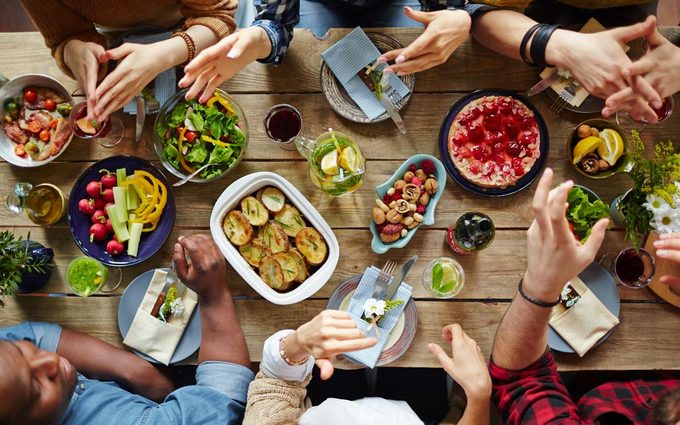What time is dinner? Whenever you get hungry! But deciding whether to call it dinner vs. supper? Now that’s when the answer gets tricky.

Here’s When You Should Use “Dinner” vs. “Supper”

In everyday conversations, the terms supper and dinner are used interchangeably. No matter which word someone says, you’ll know they’re referring to the last meal of the day. But when it comes to the literal meaning of the terms, the use of dinner vs. supper isn’t so quite straightforward.
Got an invite that mentions mealtime? Depending on whether it says “supper” or “dinner,” you can guess how much food will be served and when you’ll eat—crucial intel when you’re debating whether to sneak a snack or show up hungry and hopeful. What gives? This often-confused word pair has roots in dining traditions from a few generations ago. So while dinner and supper might sound interchangeable today, their origins tell a different story.
Read on to find out the official meanings of dinner vs. supper, from their centuries-old origins to their use today.
Get Reader’s Digest’s Read Up newsletter for more knowledge, tech, travel, cleaning, humor and fun facts all week long.
Dinner vs. supper: What’s the difference?
These days, there isn’t much of a difference. Most people use them interchangeably. But when you’re referring to the dictionary-approved definition or the historical meaning, the dinner vs. supper divide widens.
To better understand the difference, let’s zero in on the current definitions and how people defined the words in the past.
Modern definition
According to Merriam-Webster, a dinner is “the principal meal of the day,” while a supper is “the evening meal, especially when dinner is taken at midday.” It’s clear that supper, too, can be used to mean the last meal of the day, but only when a bigger meal precedes it.
Since these aren’t words that mean completely different things, you won’t be committing a language blunder if you replace the word dinner with supper to mean the last meal of your day. (Unless you find yourself in the 18th century, when your choice of dinner vs. supper would have to be more cautiously made.)
Historical use
While dinner and supper are not old-fashioned words, they did have a different connotation until a few centuries ago. Supper stems from the Old French word souper, meaning “evening meal.” And that’s how it was used for centuries.
“[In the 18th and early 19th centuries,] Americans regularly ate a light supper as their evening meal because they were eating dinner—the biggest meal of the day—around noon,” food historian Helen Zoe Veit told NPR. That big midday meal gave farmers the strength and energy to get through the rest of their workday, according to JSTOR Daily.
So when did supper and dinner become synonymous?

Previous generations had the dinner vs. supper debate all figured out. So what changed? The answer lies in shifting dining traditions and how mealtime has evolved over the years.
Eating the biggest meal of the day around noon started to become a thing of the past when more Americans began working away from their homes and farms. “They couldn’t readily return home to cook and eat in the middle of the day,” explained Veti. More and more people shifted their main meal of the day to the evening, when they could spend more time enjoying their food and conversing with their family.
Dinner vs. supper: Which is correct?
Both! But if you want to use the terms dinner and supper accurately, it may help to consider the context in which you’ll be using them.
- Formal vs. informal setting: Dining etiquette changes depending on the setting, as does the vocabulary you should use. In an informal setting, using either of the two words should be absolutely fine. (Because if your friends don’t get you, who will?) But when it comes to a more formal setting—think: a meal that involves a dress code—using the term dinner would be more accurate if it involves a heavy meal; supper is a better option if you plan to have a lighter spread.
- Regional context: Today, you might notice that the term supper is more commonly used in Southern and Midwestern states, probably due to those regions having a greater reliance on agriculture than Northern states and thus having more ancestors who were farmers.
In the end, whether you call it dinner or supper may come down to what’s on your plate (and how much), the time on the clock and where you grew up. So go ahead, send the invite … just don’t forget dessert.
Why trust us
At Reader’s Digest, we’re committed to producing high-quality content by writers with expertise and experience in their field in consultation with relevant, qualified experts. We rely on reputable primary sources, including government and professional organizations and academic institutions as well as our writers’ personal experiences where appropriate. We verify all facts and data, back them with credible sourcing and revisit them over time to ensure they remain accurate and up to date. Read more about our team, our contributors and our editorial policies.
Sources:
- NPR: “How Many Daily Meals Did We Once Eat?”
- Merriam-Webster: “Definition of dinner”
- Merriam-Webster: “Definition of supper”
- Merriam-Webster: “Has ‘supper’ always meant ‘dinner?'”
- JSTOR Daily: “Why Do Americans Eat Three Meals a Day?”






















